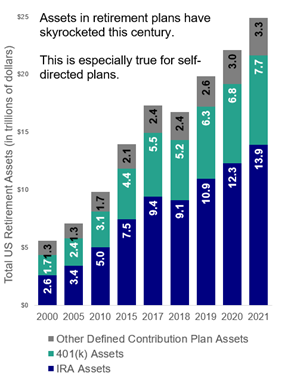
Congress Likely to Act on Retirement Legislation
Congress is looking to build on 2019 efforts to expand employees’ access to retirement plans and to increase retirement savings. The House recently passed retirement legislation with an overwhelmingly bipartisan vote and we expect the Senate to act later this year.
In 2019, Congress passed the Secure Act, retirement legislation to make it easier for companies to offer retirement plans for their employees. Congress is looking to build on those efforts by passing new retirement legislation this year. At the end of March, the House of Representatives passed the Secure Act 2.0 on a 414-5 vote. Key Senators have a slightly different view of what retirement provisions should be enacted and will seek to chart their own course. But taken together, there is a strong appetite in both the House and Senate to pass retirement legislation in 2022.
Key provisions in the House bill:
- Increases the age at which individuals must take required minimum distributions (RMDs) from their retirement accounts to age 73 in 2023, to 74 in 2030, and to 75 in 2033
- Reduces tax penalty for not taking RMDs to 25% (from 50%)
- Increases to $10,000 the limit for catch-up payments to 401(k)s for those aged 62-64 beginning in 2024, and treats those payments as after-tax income
- Indexes to inflation the $1,000 annual maximum catch-up payment for IRAs for those aged 50 and older
- Indexes to inflation the current $100,000 cap for qualified charitable distributions (QCDs) and allows a one-time QCD transfer of up to $50,000 via charitable gift annuity, charitable remainder unitrust, or charitable remainder annuity trust
- Requires businesses offering new 401(k) or 403(b) plans to auto-enroll their employees in those plans (with an opt-out option) beginning at 3% of income and increasing by 1% per year to 10% of income
- Doubles the tax credit for the costs of setting up a retirement plan for small businesses of up to 50 employees
While the House bill passed with a near-unanimous vote, the Senate has its own ideas of what provisions to include. The Senate will try to pass its own legislation, which, if successful, will require the two chambers to negotiate a final version. A number of the Senate proposals already overlap with the provisions in the House bill, including: raising the age for RMDs to 75 years, cutting the penalty for not taking RMDs to 25%, allowing $10,000 in 401(k) catch-up contributions, and creating a “lost and found” database for individuals to find their former retirement plans. In terms of timing, the Senate has a number of other bills on its agenda this Spring. As a result, we expect the Senate to act on retirement legislation later this year, possibly not until after the November midterm elections, during the lame-duck session of Congress. However, given the bipartisan nature of this legislation, some retirement legislation is likely to be enacted into law this year.
Disclosures
This is not a complete analysis of every material fact regarding any company, industry or security. The opinions expressed here reflect our judgment at this date and are subject to change. The information has been obtained from sources we consider to be reliable, but we cannot guarantee the accuracy.
This report does not provide recipients with information or advice that is sufficient to base an investment decision on. This report does not take into account the specific investment objectives, financial situation, or need of any particular client and may not be suitable for all types of investors. Recipients should consider the contents of this report as a single factor in making an investment decision. Additional fundamental and other analyses would be required to make an investment decision about any individual security identified in this report.
For investment advice specific to your situation, or for additional information, please contact your Baird Financial Advisor and/or your tax or legal advisor.
Fixed income yield and equity multiples do not correlate and while they can be used as a general comparison, the investments carry material differences in how they are structured and how they are valued. Both carry unique risks that the other may not.
Past performance is not indicative of future results and diversification does not ensure a profit or protect against loss. All investments carry some level of risk, including loss of principal. An investment cannot be made directly in an index.
Strategas Asset Management, LLC and Strategas Securities, LLC are affiliated with and wholly owned by Robert W. Baird & Co. Incorporated, a broker-dealer and FINRA member firm, although the firms conduct separate and distinct businesses.
Copyright 2020 Robert W. Baird & Co. Incorporated.
Other Disclosures
UK disclosure requirements for the purpose of distributing this research into the UK and other countries for which Robert W. Baird Limited holds an ISD passport.
This report is for distribution into the United Kingdom only to persons who fall within Article 19 or Article 49(2) of the Financial Services and Markets Act 2000 (financial promotion) order 2001 being persons who are investment professionals and may not be distributed to private clients. Issued in the United Kingdom by Robert W. Baird Limited, which has an office at Finsbury Circus House, 15 Finsbury Circus, London EC2M 7EB, and is a company authorized and regulated by the Financial Conduct Authority. For the purposes of the Financial Conduct Authority requirements, this investment research report is classified as objective.
Robert W. Baird Limited ("RWBL") is exempt from the requirement to hold an Australian financial services license. RWBL is regulated by the Financial Conduct Authority ("FCA") under UK laws and those laws may differ from Australian laws. This document has been prepared in accordance with FCA requirements and not Australian laws.

